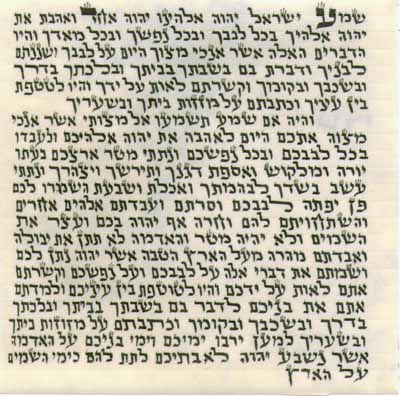
| | Accueil | Annonces | Arts | Calendar | Cartes | Chat | Commentaires | Communautés | Coutumes | Culture | Délires | | |
| | Enregistrement | e-Souks | Forum | Fun | Galerie Photo | Genealogie | Harissatheque | Histoire | JRencontre | | |
| | Kandil | KesTuCherch | La bouffe | Links | Loterie | Medias | Musique | Objectif | Paracha | Plan du site | Portail | | |
| | Recherche | Religion | Sommaire | Sondages | Souvenirs | Telecom | Tunes Célèbres | Voyages | | |
|


"My home is my castle" is not only an old English
proverb, but a
simple truth, as old as mankind. It is man's home where he actually
"lives," where he is really himself.
Judaism, being the "teaching of life" (Torat Chaim) is a faith
not confined to synagogues. "The entire earth is full of His
glory." [Isaiah 6:3]
Not only synagogues or other official places of worship, but man's
home is the Jew's sanctuary. "How goodly are thy tents, O Jacob, thy
dwelling places, O Israel" -- the non-Jewish Balaam was compelled to
admit.
The sanctity of the Jewish home is symbolized by the "Mezuzah," a
small scroll affixed at the doorpost of every Jewish home, and in
every room therein.
It is a solemn reminder to all who go out and in, that the house is a
Jewish home, devoted to the ideals of the Scripture-passages appearing
on it. It is also a symbol of G-d's watchful care over the house and
its dwellers. It reminds both dwellers and visitors of the house,
right at the entrance: This house is a sanctuary to the Almighty.
* * * * *
What does the "Mezuzoh" contain? It contains the two Biblical
passages in which mention is made of this Divine commandment: "Shema"
and "Vehaya" (Deut. 6:4-9, Deut. 11:13-21).
"Shema" declares the Unity of the One G-d, and our sacred, eternal
duty to serve Him, and only Him, and never to forsake our faithfulness
to Him.
"Vehaya" -- expresses G-d's assurance to us of compensation that
will follow our observance of the Torah's precepts, and warns of
retribution for disobedience to them.
Both passages, as said, contain the Commandment (Mitzvah): "And thou
shalt write them upon the door-posts of thy house and upon thy gates."
Thus, it is already "the door post" of the Jewish house that testifies
to the effect that it is an entrance to a place where the Unity of G-d
is being proclaimed by every phase of every-day life taking place
within its walls.
And it is not only "upon the door post of thy house" that the Mezuzoh
has to be affixed. To be sure, it is "thy" house, the house of the
Jewish individual, the Jewish Family, in the first place; but Judaism
does not embrace only the life of the individual; it is not a "private
matter." The Mezuzoh is not affixed only on doors of private houses;
it has to be affixed also "upon thy gates." The affixing of the
Mezuzoh on gates leading to communal places, even on gates of cities
(where there are such), symbolizes the sovereignty of the Divine
commandments as outlined in "Shema," also over the Jewish social and
communal life in all its aspects.
On the other hand, a Mezuzoh affixed - for example - at the entrance -
gate of a city, would not exempt each individual house within that
city from the duty of affixing a "Mezuzoh" of its own. The Jewish
Community is health and wholesome only if composed of spiritually
healthy and wholesome individuals and families.
| | Accueil | Annonces | Arts | Calendar | Cartes | Chat | Commentaires | Communautés | Coutumes | Culture | Délires | |
| | Enregistrement | e-Souks | Forum | Fun | Galerie Photo | Genealogie | Harissatheque | Histoire | JRencontre | |
| | Kandil | KesTuCherch | La bouffe | Links | Loterie | Medias | Musique | Objectif | Paracha | Plan du site | Portail | |
| | Recherche | Religion | Sommaire | Sondages | Souvenirs | Telecom | Tunes Célèbres | Voyages | |
Pour toutes informations, critiques et commentaires, envoyez un email a : jhalfon@mediaone.net